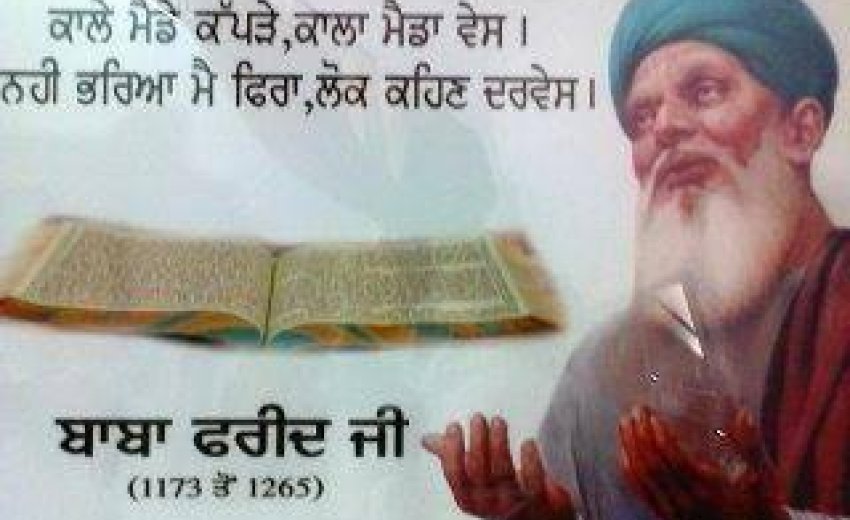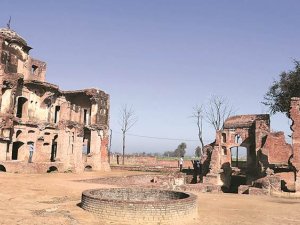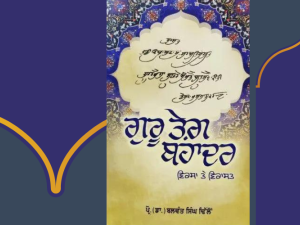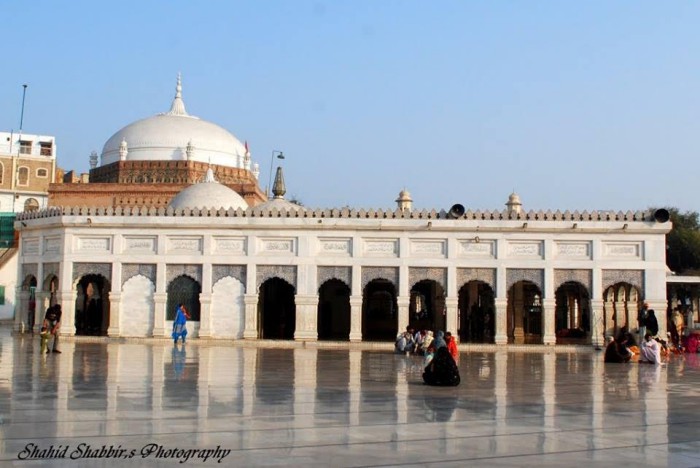 |
| Darbar of Hazrat Baba Farid Ji |
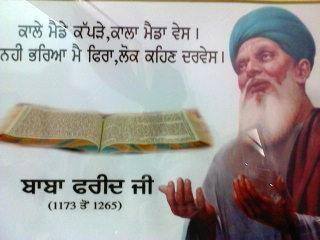 Shaikh Farid (1173-1265), the great Sufi mystic and teacher, the first recorded poet in the Punjabi language was born in the month of Ramadan in the year 1173AD/569 AH at a place near Multan called Kotheval. His father Shaikh Jamaluddin Sulaiman left his home in Central Asia during the period of Mongol incursions in the course of the twelfth century. Seeking safety and some place to settle in, he came into the Punjab where already under Ghaznavid rule. Several Muslim religious centres had developed and sizeable Muslim populations had grown, particularly in the areas now included in West Punjab (Pakistan).
Shaikh Farid (1173-1265), the great Sufi mystic and teacher, the first recorded poet in the Punjabi language was born in the month of Ramadan in the year 1173AD/569 AH at a place near Multan called Kotheval. His father Shaikh Jamaluddin Sulaiman left his home in Central Asia during the period of Mongol incursions in the course of the twelfth century. Seeking safety and some place to settle in, he came into the Punjab where already under Ghaznavid rule. Several Muslim religious centres had developed and sizeable Muslim populations had grown, particularly in the areas now included in West Punjab (Pakistan).
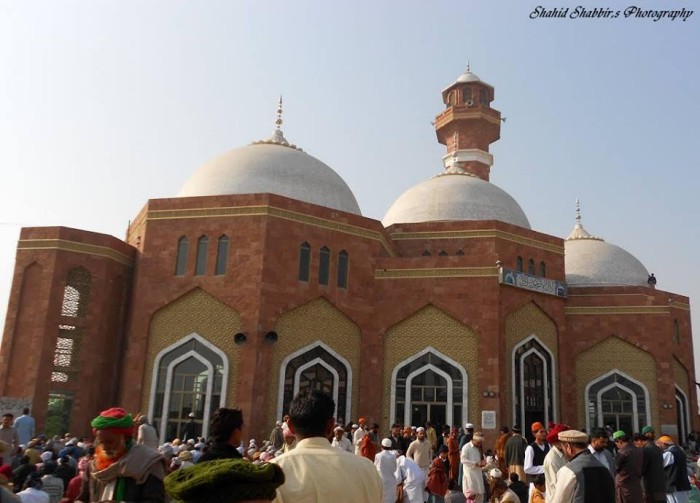 |
| Entrance to the Darbar |
Dr Harbans Singh of Sikh Encyclopaedia states that the newly born baby was named after the Sufi poet Fariduddin Attar. Farid in Arabic language means 'Unique'. He came to be known as Shakarganj or Ganj-i-Shakar (Treasury of Sugar). There is a beautiful story behind this appellation. Young Farid was brought by his mother Qarsum Bibi, an extremely pious lady as his father passed away when Farid Ji was still a child. It is said that that in order to induce the child Farid to say his prayers regularly, his mother used to place under his prayermat a small packet of shakar (country sugar) which Farid Ji would get as a reward.
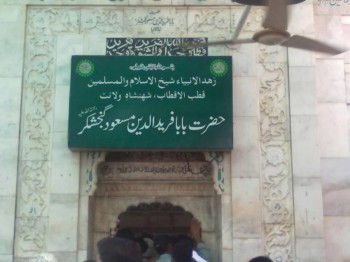 Once Qarsum Bibi forgot to put the shakar under the mat. It is said that such was the devotion of child Farid that shakar nevertheless appeared in the usual place. Following this miracle he came to be known as Shakarganj.
Once Qarsum Bibi forgot to put the shakar under the mat. It is said that such was the devotion of child Farid that shakar nevertheless appeared in the usual place. Following this miracle he came to be known as Shakarganj.
Another explanation is given is that while undergoing extreme hard penance during his youth Farid Ji in a fainting state once looked around for something to break a three days continuous fast. He was unable to find any food and put few stone pebbles into his mouth to curb his hunger. It is said by divine intervention, the stones turned into lumps of sugar.
Dr Harbans Singh attributes the title 'Shakarganj' to the blessing which Farid Ji received from his spiritual teacher, Khwaja Qutubuddin Bakhtiyar Kaki (the famous Qutb Minar in Delhi was built in his name) who praised the sweetness of Farid Ji's disposition and remarked; "You shall be sweet like sugar."
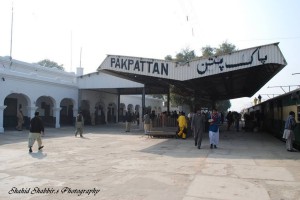 Farid Ji set up a centre of devotion at Hansi (Haryana), later shifting to Ajodhan (Pakpattan) in Sahiwal district of West Punjab. This was then a wild and arid area, with few of the comforts of life, and Farid Ji came in obedience to Khwaja Qutubuddin's command: "Go and set up settlement in some wasteland." Later, in honour of Shaikh Farid it came to be known as Pakpattan (holy ferry).
Farid Ji set up a centre of devotion at Hansi (Haryana), later shifting to Ajodhan (Pakpattan) in Sahiwal district of West Punjab. This was then a wild and arid area, with few of the comforts of life, and Farid Ji came in obedience to Khwaja Qutubuddin's command: "Go and set up settlement in some wasteland." Later, in honour of Shaikh Farid it came to be known as Pakpattan (holy ferry).
The Sufis brought the healing touch to the strife torn religious scene in those times. It is said once someone brought a pair of scissors for Farid Ji, he put it by and asked instead for a needle, saying: "I came to join not to sever." Farid Ji sent his disciples to preach his message in different parts of the country. One of them was the famous Shaikh Nizamuddin Auliya of Delhi, who recorded his visits to Farid Ji at Pakpattan. He states more often than not very little was in Farid Ji's home to eat and the family and disciples would feel blessed if they could make a meal on dela, a wild sour tasting berry growing on a leafless thorny bush.
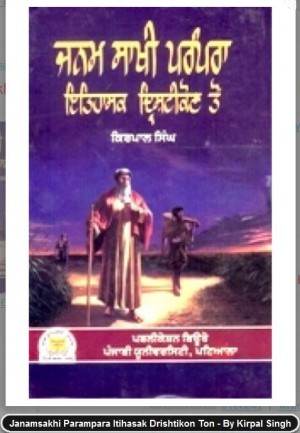 The city Faridkot (Fort of Farid) is named after him. Farid Ji had to undergo forced labour for building a fort for the local chief named Mokal. By a miracle Farid's saint hood was revealed and people showed reverence to Sufi mystic who blessed this place.
The city Faridkot (Fort of Farid) is named after him. Farid Ji had to undergo forced labour for building a fort for the local chief named Mokal. By a miracle Farid's saint hood was revealed and people showed reverence to Sufi mystic who blessed this place.
Guru Granth Sahib Ji contains four shabads and 112 shaloks of Baba Farid as he is known in Sikh tradition. Dr Harbans Singh states that Baba Farid's compositions are deeply sensitive to the feeling of pity, the subtle attractiveness of sin, inevitable death and the waste of human life owing to man's indifference to God and goodness. The language is Multani Punjabi, of an extraordinary power and sensitivity. The main theme of Baba Farid's bani is vairag, dispassion towards the world and its false attractions. In Sufi terminology this is called tauba or turning away from the materialistic world.
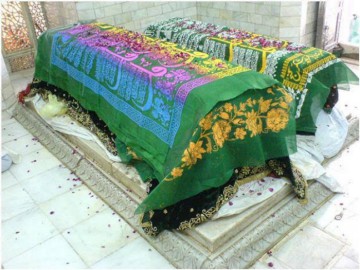 |
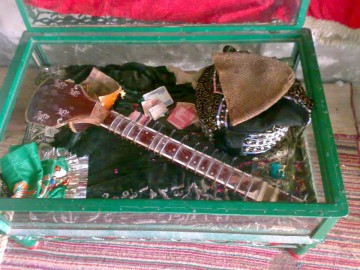 |
| Grave of Baba Farid Ji and (right) Rabab of Baba Farid Ji | |
Guru Nanak Dev Ji & Shaikh Ibrahim (Farid)
Dr Kirpal Singh, the Professor of Sikhism has written a monumental work, Janamsakhi Parampara (tradition). The book states that Guru Nanak Dev Ji and Bhai Mardana met Shaikh Ibrahim at Pakpattan who occupied the spiritual seat of Baba Farid.
Vilayatvali Janamsakhi, records a beautiful conversation between Guru Ji and Shaikh Ibrahim. During those times holy men used to express their feelings in verse. The tradition was so strong that every such saint would either possess or remember by heart his own verses or famous verses of some other holy man. One day having a discourse on God with Guru Ji, Shaikh Ibrahim recited this couplet:
ਫਰੀਦਾ ਪਾੜਿ ਪਟੋਲਾ ਧਜ ਕਰੀ ਕੰਬਲੜੀ ਪਹਿਰੇਉ ॥
Fareedhaa Paarr Pattolaa Dhhaj Karee Kanbalarree Pehiraeo ||
Fareed, I have torn my clothes to tatters; now I wear only a rough blanket.
ਜਿਨ੍ਹ੍ਹੀ ਵੇਸੀ ਸਹੁ ਮਿਲੈ ਸੇਈ ਵੇਸ ਕਰੇਉ ॥੧੦੩॥
Jinhee Vaesee Sahu Milai Saeee Vaes Karaeo ||103||
I wear only those clothes which will lead me to meet my Lord. ||103||
Guru Granth Sahib, Ang 1383
Guru Ji replied:
ਘਰ ਹੀ ਮੁੰਧਿ ਵਿਦੇਸਿ ਪਿਰੁ ਨਿਤ ਝੂਰੇ ਸੰਮ੍ਹਾਲੇ ॥
Ghar Hee Mundhh Vidhaes Pir Nith Jhoorae Sanmhaalae ||
The soul-bride is at home, while the Husband Lord is away; she cherishes His memory, and mourns His absence.
ਮਿਲਦਿਆ ਢਿਲ ਨ ਹੋਵਈ ਜੇ ਨੀਅਤਿ ਰਾਸਿ ਕਰੇ ॥੧॥
Miladhiaa Dtil N Hovee Jae Neeath Raas Karae ||1||
She shall meet Him without delay, if she rids herself of duality. ||1||
Guru Granth Sahib, Ang 594
Shaikh Ibrahim’s response was:
ਫਰੀਦਾ ਨੰਢੀ ਕੰਤੁ ਨ ਰਾਵਿਓ ਵਡੀ ਥੀ ਮੁਈਆਸੁ ॥
Fareedhaa Nandtee Kanth N Raaviou Vaddee Thhee Mueeaas ||
Fareed, when she is young, she does not remember her Husband. When she grows up, she dies.
ਧਨ ਕੂਕੇਂਦੀ ਗੋਰ ਮੇਂ ਤੈ ਸਹ ਨਾ ਮਿਲੀਆਸੁ ॥੫੪॥
Dhhan Kookaenadhee Gor Maen Thai Seh Naa Mileeaas ||54||
Lying in the grave, the soul-bride cries, ""I did not meet you, my Lord.""||54||
Guru Granth Sahib, Ang 1380
To this Guru Ji replied:
ਮਹਲ ਕੁਚਜੀ ਮੜਵੜੀ ਕਾਲੀ ਮਨਹੁ ਕਸੁਧ ॥
Mehal Kuchajee Marravarree Kaalee Manahu Kasudhh ||
The rude, ill-mannered bride is encased in the body-tomb; she is blackened, and her mind is impure.
ਜੇ ਗੁਣ ਹੋਵਨਿ ਤਾ ਪਿਰੁ ਰਵੈ ਨਾਨਕ ਅਵਗੁਣ ਮੁੰਧ ॥੧॥
Jae Gun Hovan Thaa Pir Ravai Naanak Avagun Mundhh ||1||
She can be with her husband Lord, only if she is virtuous. O Nanak, the soul-bride is unworthy, and without virtue. ||1||
Guru Granth Sahib Ang 1088
Shaikh Ibrahim was deeply impressed and asked Guru Ji that it needed a dagger to kill the mind. To this the Guru Ji replied:
ਸਚ ਕੀ ਕਾਤੀ ਸਚੁ ਸਭੁ ਸਾਰੁ ॥
Sach Kee Kaathee Sach Sabh Saar ||
The knife is Truth, and its steel is totally True.
ਘਾੜਤ ਤਿਸ ਕੀ ਅਪਰ ਅਪਾਰ ॥
Ghaarrath This Kee Apar Apaar ||
Its workmanship is incomparably beautiful.
ਸਬਦੇ ਸਾਣ ਰਖਾਈ ਲਾਇ ॥
Sabadhae Saan Rakhaaee Laae ||
It is sharpened on the grindstone of the Shabad.
ਗੁਣ ਕੀ ਥੇਕੈ ਵਿਚਿ ਸਮਾਇ ॥
Gun Kee Thhaekai Vich Samaae ||
It is placed in the scabbard of virtue.
ਤਿਸ ਦਾ ਕੁਠਾ ਹੋਵੈ ਸੇਖੁ ॥
This Dhaa Kuthaa Hovai Saekh ||
If the Shaykh is killed with that.
ਲੋਹੂ ਲਬੁ ਨਿਕਥਾ ਵੇਖੁ ॥
Lohoo Lab Nikathhaa Vaekh ||
Then the blood of greed will spill out.
ਹੋਇ ਹਲਾਲੁ ਲਗੈ ਹਕਿ ਜਾਇ ॥
Hoe Halaal Lagai Hak Jaae ||
One who is slaughtered in this ritualistic way, will be attached to the Lord.
ਨਾਨਕ ਦਰਿ ਦੀਦਾਰਿ ਸਮਾਇ ॥੨॥
Naanak Dhar Dheedhaar Samaae ||2||
O Nanak, at the Lord's door, he is absorbed into His Blessed Vision. ||2||
Guru Granth Sahib Ang 956
Shaikh Ibrahim felt very happy to listen to this and he handed over many couplets of Baba Farid that lay with him to Guru Ji.
My Islamabad based friend Shahid Shabbir of Pakistan Heritage Club and Save Historical Places of Pakistan has kindly shared his photographs of Darbar (Mausoleum) of Hazrat Baba Farid Masood Ganj e Shakar.

